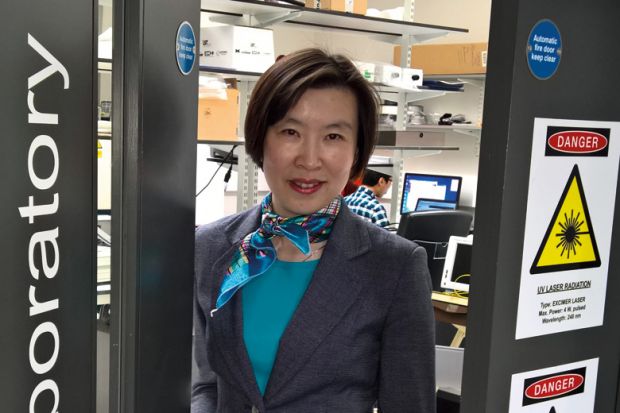Tong Sun is professor of sensor engineering and director of the Research Centre for Photonics and Instrumentation at City University London. She was City’s first female professor of engineering in its 100-year history and is an international leader in the use of optical fibre sensors to monitor sensitive equipment, particularly in extreme conditions. In June, she was one of three recipients of the Royal Academy of Engineering’s Silver Medal, which recognises outstanding and demonstrated personal contribution to British engineering by an engineer with less than 22 years in full-time employment or equivalent.
Where and when were you born?
In southern China, in 1968.
How has this shaped you?
I was born at a good time in China’s history – by the time I went to primary school, China had restored its educational system after the Cultural Revolution. I was fortunate to have received the best, yet free, education in China, from school to my engineering training at university.
What were your immediate reactions to winning the award?
Thrilled and thankful to the academy for the recognition, and thankful to my mentor for the nomination and the tremendous support he has kindly provided over the past 20 years.
The award honours those who have made a considerable impact in the field in a short time – some achievement. What kind of work schedule does that entail? Were you up all hours for two decades?
It counts from my PhD study in precision instrumentation in China, followed by the development of my research topic from precision instrumentation through to optical fibre sensing at City from 1996. It has been hard work and has meant that I have had to work long hours sometimes to submit papers or grant applications on time – but that is what I expect.
Your research has been usefully applied in a variety of areas, including helping to detect drugs in freight shipments and to combat food spoilage in China. What kind of feeling do you get when you see your work employed in such diverse ways?
A sense of satisfaction when I see that more and more industrial sectors are taking up the novel sensors developed to innovate their products – my dream is to see the novelty in the sensor design being translated into measurable industrial impacts.
It is often said that the UK lacks female engineers; why is this, and what might be done about it?
Strongly promoting science and engineering to female students in schools, showing them the excitement of being an engineer, would make a difference. I am very keen to do what I can to show female students how exciting – and rewarding – engineering is as a career.
Did you always want to be an academic, or did you fall into research accidentally?
I have always wanted to be a scientist or an engineer. Being in academia was a career choice starting with a job offer from Nanyang Technological University in Singapore as an assistant professor in 2000. I came to City as a lecturer in 2001 and enjoyed the challenges here. This led to my staying in academia ever since.
Your experience in the academy began as a student in your native China and has seen you work at NTU. We hear many stories about the potential for East Asia’s higher education offering. Is that potential now being realised?
The huge investment in education, science and technology from both the Chinese government and the Singaporean government has been staggering and very welcome. The long-term significance, nationally and internationally, of the investment [is already] being seen – more leading figures in the global workforce in science and engineering. It is very exciting.
What has changed most in higher education in the past five to 10 years?
The curriculum is more tailored to better prepare the students for the job market as the competition for the top jobs is intense. Research is even more important, and, with that, its impact is critical to how it is viewed nationally and internationally.
What is the worst thing anyone has ever said about your academic work?
Like everyone, I have had reviewers’ comments that irritate and disappoint, because they show that the reviewer has not understood – but you just put them aside and get on with the next application.
What keeps you awake at night?
Trying to keep everything in balance and not work too late helps me not stay awake at night. I don’t read emails late in the evening!
What do you do for fun?
Travel for leisure – [there are many] more exotic areas in China worth exploring.
What’s your biggest regret?
Not being able to see the family in China as often as I would like when I am based in England – but I try to visit when I can.
What’s your most memorable moment at university?
At the end of each term, what was then a 34-hour journey by train back home to see family and friends again was a great moment.
What is the biggest misconception about your field of study?
That engineers always need an oily rag and spanner. We need people to understand just how traditional engineering has been transformed and, at the same time, how it transforms lives.
What one thing would improve your working week?
Less crowding on the Tube and no signal failures on the journey – especially when I have a 9am lecture on a Monday!
If you were the UK higher education minister for a day, what policy would you immediately introduce to the sector?
Keep the sector closely aligned with Europe and the international community, and do not let Brexit condemn Britain to a second-class status in education and research.
Appointments
Diamond Ashiagbor, an expert in labour law, has been appointed to the Institute of Advanced Legal Studies, part of the University of London’s School of Advanced Study (SAS). At the IALS, Professor Ashiagbor, who is currently professor of labour law at Soas, University of London, will take responsibility for its research promotion and facilitation strategy and its research studies programme. She previously held a reader position at University College London and has been a visiting scholar at the Columbia Law School in New York and at the European University Institute in Florence. She said that she was looking forward to helping develop the institute “as a vibrant intellectual centre for research in law, and for scholarship which brings together law with the humanities as well as social science disciplines”. She will take up her position in October.
Cillian Ryan has started in his new position as pro vice-chancellor international and head of the College of Business, Law and Social Sciences at Nottingham Trent University. Professor Ryan, who took up his position on 11 July, was previously pro vice-chancellor and dean of the Faculty of Business and Law at De Montfort University. Professor Ryan noted that the social sciences were “crucial to shaping the society we live in, the way we do business, the structure of our economy, and the fairness and effectiveness of our laws” and said that he was “excited at the prospect of working with colleagues with the energy, expertise and experience to shape that agenda through our teaching, research and outreach”.
Bob Steele, head of cancer research at the University of Dundee’s School of Medicine, has been appointed the independent chair of the UK National Screening Committee, which advises ministers and the NHS in all four countries. Margaret Monckton has been appointed chief financial officer of the University of Nottingham. The University of Derby has appointed Judith Lamie and Malcolm Todd as pro vice-chancellors.
POSTSCRIPT:
Print headline: HE & me
Register to continue
Why register?
- Registration is free and only takes a moment
- Once registered, you can read 3 articles a month
- Sign up for our newsletter
Subscribe
Or subscribe for unlimited access to:
- Unlimited access to news, views, insights & reviews
- Digital editions
- Digital access to THE’s university and college rankings analysis
Already registered or a current subscriber?






